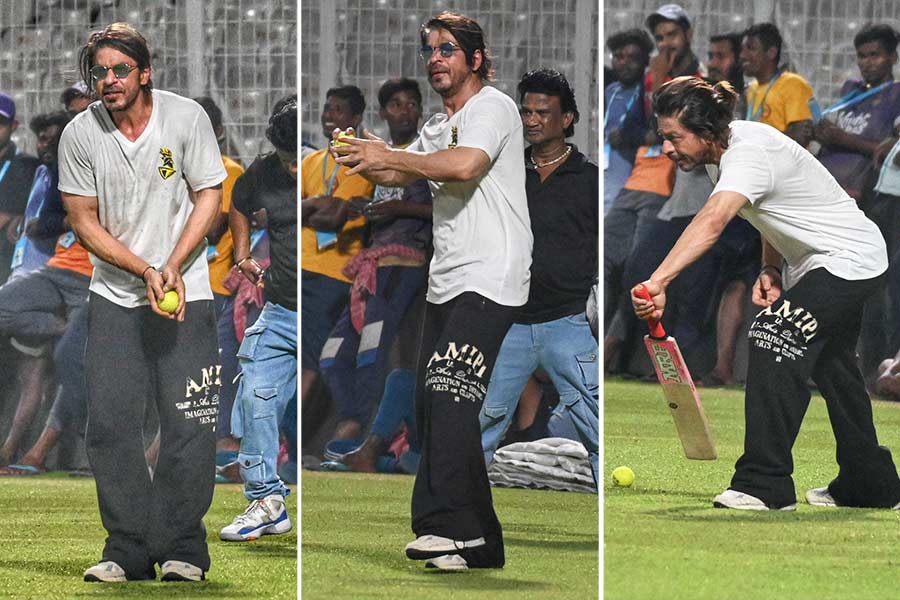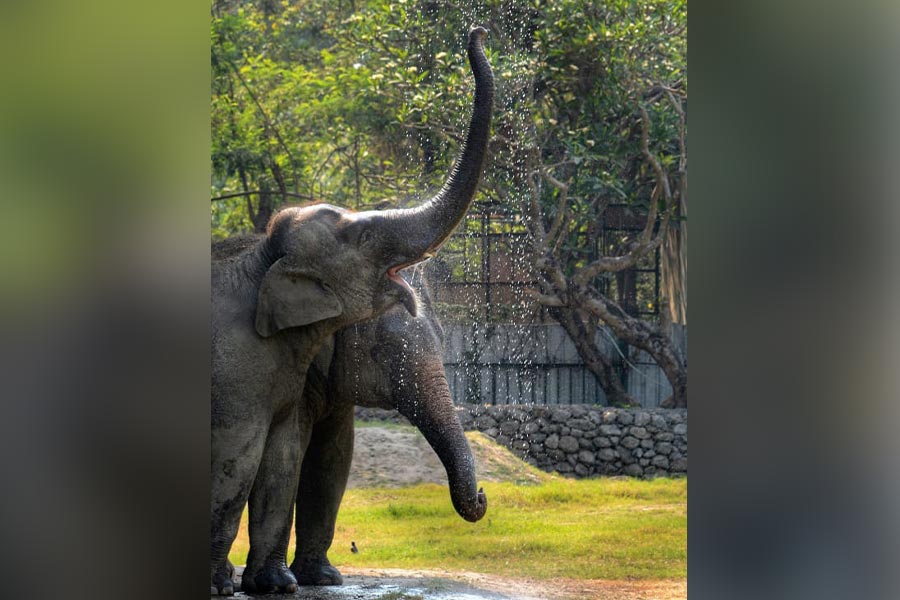Meeting Jyotishka Dasgupta, and hearing him play the piano, is like having a front-row seat in a time capsule with a screen playing unforgettable melodies. The veteran music director, who worked with Mrinal Sen and Aparna Sen, and won the admiration of Satyajit Ray, and scored music for Ek Din Achanak, Saanjhbatir Roopkothara, Bedeni, 15 Park Avenue, Yugant, Unishe April and many more films, is also the man behind C4, a well-known music institute in Salt Lake, and also a driving force behind the iconic Calcutta School of Music.
In a freewheeling chat with My Kolkata, Dasgupta (popularly known as Jyotishka da across age groups), talked about music, his journey as a musician, experiences with cine stalwarts and more. Edited excerpts from the conversation follow...
My Kolkata: How did music come into your life and at what age did you decide to devote your life to music?
Jyotishka Dasgupta: Music came to my life at a very early age because I started to play the piano at the age of five. I was very fortunate to get a very gentle, kind and inspiring teacher. Through his encouragement, love and affection, my love for music grew. It was an intense attraction to the piano and to music. I remember performing from a very early age. When people came over, I would play all the pieces that I had learnt. There was nothing challenging about them but I enjoyed performing those pieces for the people. And I guess that is how it started.
I started teaching in 1974 when I finished my basic training. And I realised I enjoyed teaching almost as much as I enjoyed learning. From 1974 till date, I have had at least three or four students whom I have trained. And that has been a very enjoyable experience.
Who was your first guru?
My first guru was Mr. Cummins, who used to live at Park Circus and was almost 70-years-old when he started to teach me. I learnt piano from him between 1965 to 1970. The best part about those sessions was, after my classes, I would request him to play something and he used to play many old melodies. I would be amazed at his hands playing the piano, the music. It was very inspiring.
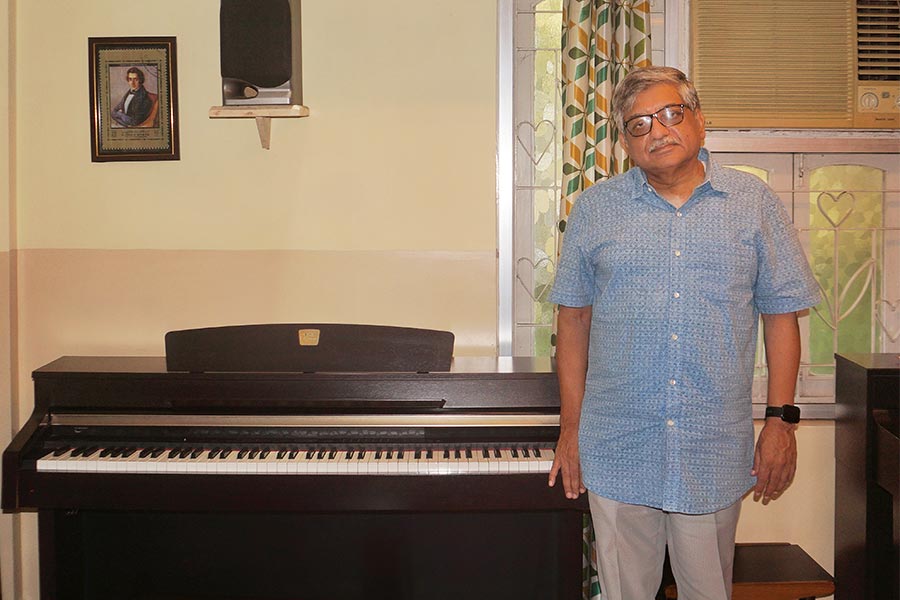
Jyotishka Dasgupta at his music institute, C4, in Salt Lake
You have worked with Mrinal Sen. This is his birth centenary year. How was your experience working with him?
It was amazing. When he called me, I was thrilled, because I had never imagined that I would get a call from him. He called and said, ‘Tumi Buddha’r (Buddhadeb Dasgupta) chobite bhalo kaaj korecho, ami chai amar chobiteo tumi kaaj korbe. Tomar bari ami aschi’ (You did good work in Buddhadeb Dasgupta’s film. I want you to work in my film too. I’m coming to your house).
We used to stay at Jodhpur Park back then, and he came to our house. He had a habit — whenever he met someone, known to him or if he was meeting for the first time, he would hold the person’s hand. It was a practice inherent to his character. He told me, ‘tumi music korbe nischoi? Ami music’er kichchu bujhina. Kintu amar chobite kon music byabohar kora jabe and konta jabena, seta kintu ami khub bhalo bujhi. Sutorang ami beche nebo kon music use kora hobe.’ (I don’t understand music, but I know what music works well and doesn’t in my films). This was my first experience.
For Ek Din Achanak, I was recording the title music in parts. He suddenly came out of the recording room and said the piece won’t fit in his film, and asked me to record a new piece. I urged him to give the whole piece a chance. When the title score took the final shape, he was thrilled and happy!
Any other unforgettable memory?
The best memory is that we share the same birthday (May 14)! I used to call him on every birthday, and whenever possible, I used to meet him at his home.
What was the creative process while scoring the music for Ek Din Achanak?
The creative process, I guess, was the same for all the films. The problem is that as music composers, we don’t get to see the film through the eyes of the director. The director has a different visualisation, and I can only do as much as locate the positions and locations where music can come in and go. It has to be a very close, intimate, detailed discussion with the director and his requirements. Because, ultimately, the whole film is the director’s creative exercise. So, I cannot impose anything — it does not work that way. I always work very closely with the director.
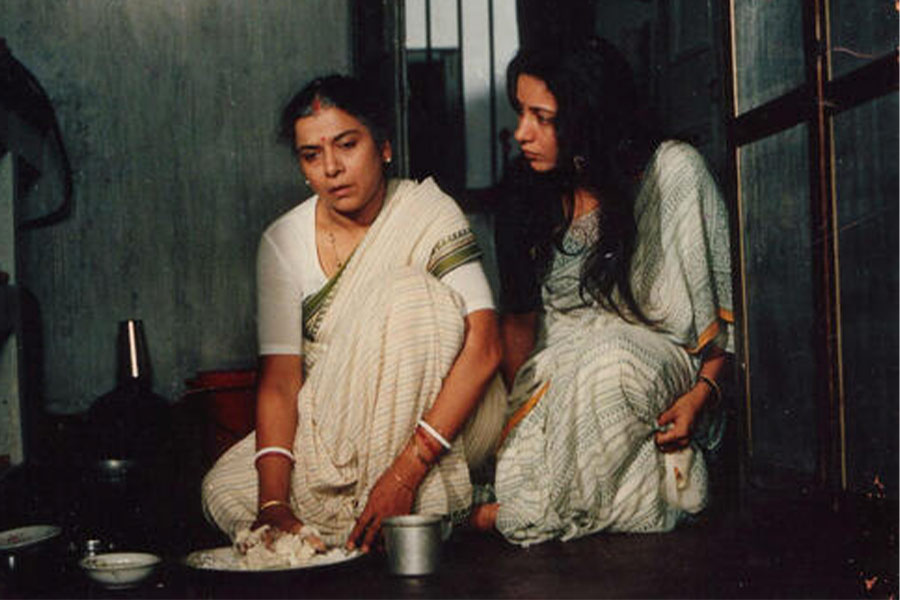
A scene from ‘Ek Din Achanak’, with Uttara Baokar and Shabana Azmi
With Mrinal Sen, he used to just tell me the sequences where he wanted the music. He never told me the kind of music he was hoping for — he only gave an outline. Back in the day, we did not get a chance to carry the footage home. It used to play on a small monitor in the recording studio, and had loud noise in the background because it was an unedited audio track. Taking notes, marking the length and then composing, that is how it used to happen.
How did scoring music for films happen?
I started composing music and working for amateur English theatre groups when I was in college. It started with that and we had good groups. Some of them are big names today. Ashok Viswanathan and Anik Dutta were my batchmates, we used to do theatre together. We performed a lot on stage with various productions. And I composed and arranged music for all those theatre productions. From there, I graduated to the Bengali serial space of that time. Those were teleserials with limited number of episodes, and I worked with good directors for those.
From there I got the opportunity to work in films. One day, Buddhadeb Dasgupta told me, “Korben amar ekta chobite music?” (Will you do the music for one of my films?)
You have worked with many stalwarts in your journey as a musician. What are the memories that stand out and always will?
Walking into Dakshinapan one day, I bumped into Sandip Ray. We were acquainted. He said, “Tumi Mrinaldar chhobite music diyechho? Baba dekhte giyechhilen.” (You gave music for Mrinalda’s film? Baba saw the film).
Naturally, my heart skipped a few beats. I asked “Kicchu bolechhen?” (Did he say anything?) Sandip Ray said, “Baba bollen je chheleta kaaj korechhe shey Western Classical ta gule kheyechhe.” (Baba said, the boy who gave the music has good command over Western Classical music). That memory stands out.
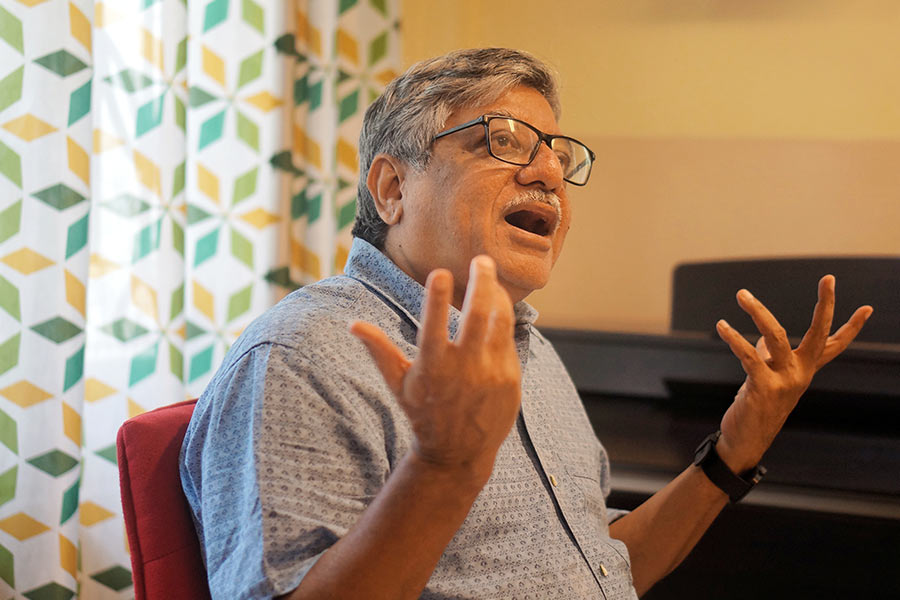
‘I always work very closely with the director. I do not impose anything — it does not work that way,’ says Dasgupta
You have been a part of Dolna Day School and Calcutta School of Music. How do you see your journey with them?
I joined CSM in 1972 as a piano student. My journey is now at its fag end. As long as people find me useful and able to contribute, I guess I will be around. Both are institutions built on reliable foundations and have a long future ahead.
Why did you decide on starting C4? What are your future plans for C4?
I started teaching in 1974 and started C4 in 1997 and the Salt Lake unit was added in 2005. Teaching has always been a passion. C4 should continue to be remembered as the music school where there is no compromise in teaching standards.
From when you started as a musician till date, how has Kolkata’s musicscape evolved? What are the good and the bad aspects of this evolution?
I don’t really know. As far as Western Classical is concerned, which is my core area of interest, a lot more students are pursuing it seriously now. One bad aspect that is noticeable, is movement away from the purity of a performance or mutilating an original composition (perhaps mostly applicable to Rabindrasangeet). What people need to believe is that they do not need to mutilate Rabindrasangeet to prove their originality or creativity. The other discouraging aspect is very few people are pursuing Indian Classical Music, particularly instruments like sitar, sarod, sarengi, esraaj etc.
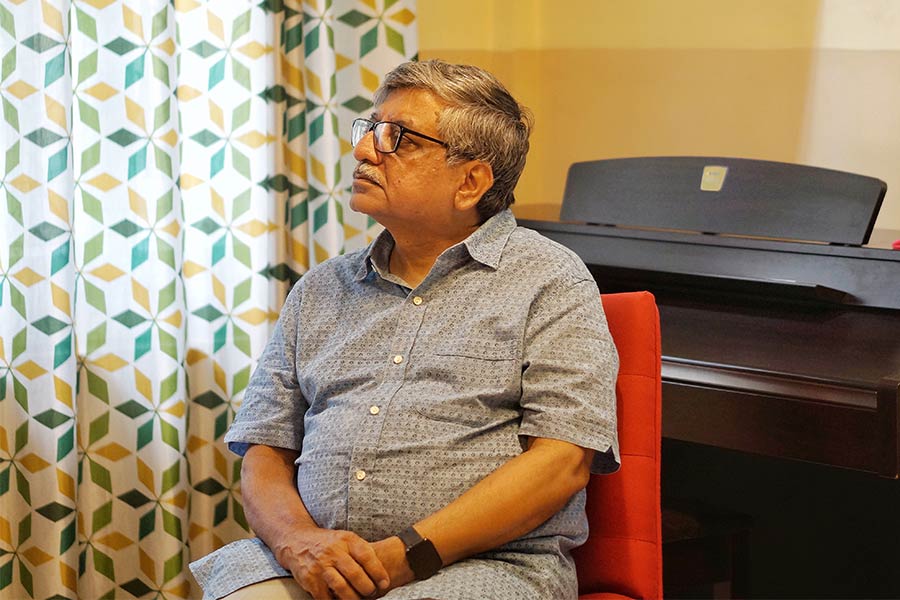
‘Very few people are pursuing Indian classical music now,’ rues Dasgupta
Classical music and instrumental music have a niche audience. If you were to suggest a guideline to build listening habits in children and young adults, what are the few things that must be kept in mind?
To build musical tastes, parents can start when the children are really young. Playing classical music while the child is playing, eating and even sleeping. Let the music seep in.
Any upcoming film projects or concerts that you would like to share with us?
I am working on harmonising songs that have not been harmonised – in several layers. Not traditional harmony, but creative harmony.
Were there any music-related opportunities that you wish you had taken but could not?
There was a project that never happened – Gulel under Aparna Sen's baton (with Ajay Devgn and Urmila Matondkar in the cast). The music, scores and lyrics by Javed Akhtar were all ready. It never materialised. Would have been an unusual soundtrack. I was looking forward to it.
Rapid fire with Jyotishka Dasgupta
Music to you is?
- An Elixir
Your favourite music composer?
- Frederick Chopin, the poet of the Piano
Your favourite period in western classical music?
- The Romantic period
Your favourite soundscape from a film that has not been composed by you?
- Most soundscapes by Andrew Lloyd Weber
Favourite composition by you?
- A flute and guitar duet that I composed for Banshiwala
If you weren’t a musician, you would be?
- I would have been a teacher




